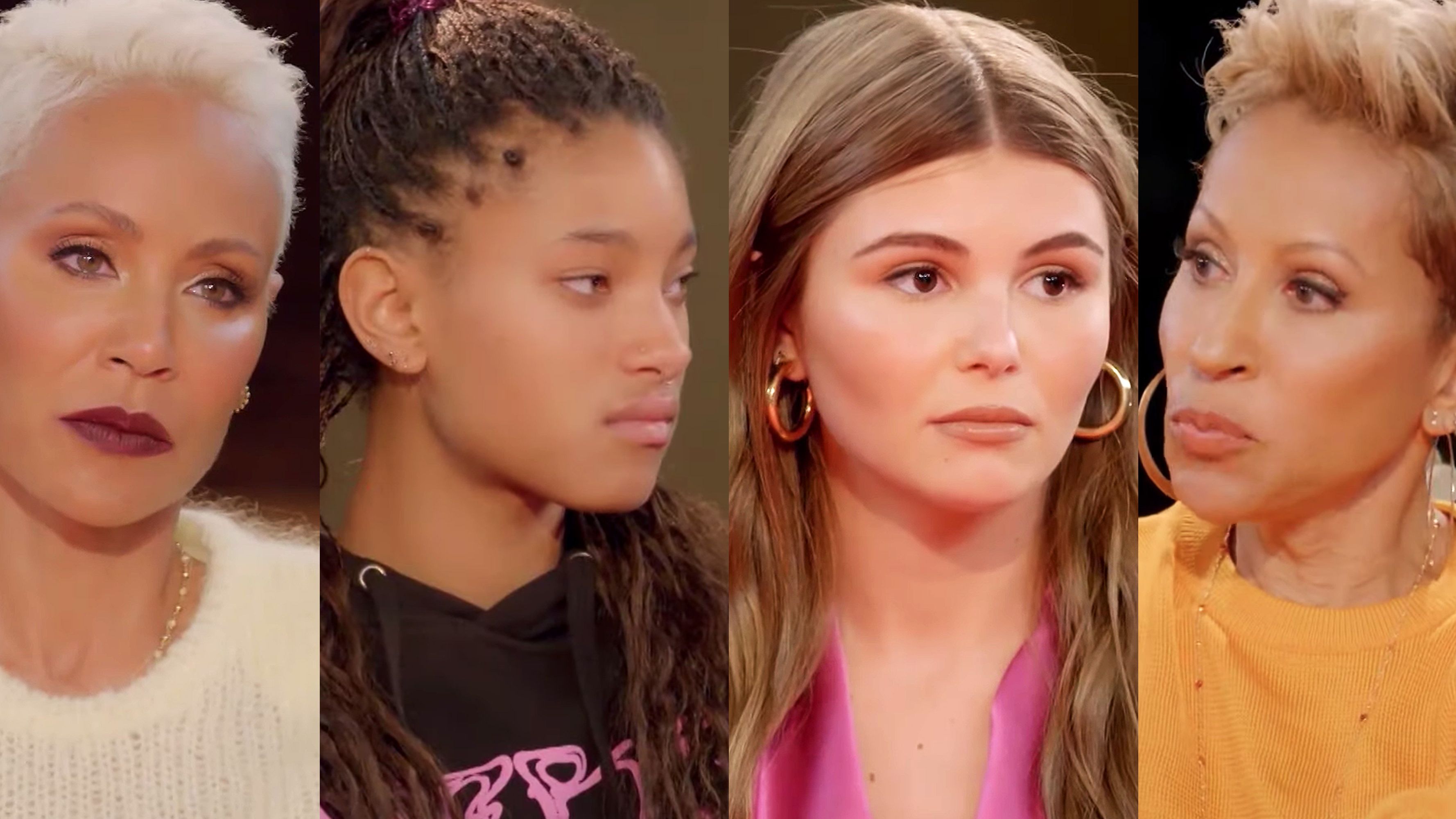Olivia Jade's Red Table Talk Appearance and the Power of Black Female Forgiveness
Jada Pinkett Smith and family created an honest discourse that we wouldn't have gotten from other outlets.


Olivia Jade, YouTube influencer and daughter to Full House star Lori Loughlin and fashion designer Mossimo Giannulli, made her first public appearance Tuesday on the Facebook Watch show Red Table Talk. It's been more than a year since the world learned of the college admissions bribery scandal in which Jade and her parents were implicated (Loughlin and Giannulli are currently serving short-term prison sentences for bribing the University of Southern California with $500,000 so that their two daughters, Olivia and Isabella, could gain admission).
Red Table Talk, hosted by Jada Pinkett Smith, daughter Willow, and mother Adrienne Banfield-Norris, started as a place for generations of Black women to have candid conversations. It’s since evolved into somewhere celebrities are invited to discuss uncomfortable personal situations. Former guests include Jordyn Woods, who spoke out about her falling out with the Kardashians after an alleged affair with NBA player Tristan Thompson, and Leah Remini, who recounted her involvement with the Church of Scientology.
But the show’s brilliance is in its conception. It gives a voice to the millions of WOC across the country. Pinkett Smith and her family aren't afraid to say what many others are thinking, bolstered by their wide-ranging audience and their dedication to addressing underlying issues. Perhaps that’s the secret behind the show’s success: It is rare and refreshing to see the elite and privileged confronted with reality so publicly.
But Banfield-Norris, also known as “Gammy” to her family, wasn’t initially keen to even give Jade the platform to speak. It’s a position many viewers likely held as well: Why should three Black women with a successful talk show make room at the literal table for a white woman in a PR crisis? Was Jade seeking validation and approval from communities of color just to make herself feel better?
“I just found it really ironic that she chose three Black women to reach out to for her redemption story...it’s bothersome to me on so many levels,” Banfield-Norris said in the segment’s intro. “Her being here is the epitome of white privilege.”
To which Pinkett Smith responded: “I never want to be the thing that was done to me by white women.”
Forgiveness from women of color is a powerful tool in the arsenal of a white woman trying to clean up her image. But Jade insisted that wasn’t why she asked to appear on the show.
Get exclusive access to fashion and beauty trends, hot-off-the-press celebrity news, and more.
“I’m here because I want to leave it on the table,” Jade said. “I don’t want to keep dragging this throughout my life.”
The interview, while predictably awkward, yielded surprisingly insightful takeaways. Its highlights were not due to anything Jade said, but because of Banfield-Norris’s tough questions.
She grilled a visibly nervous Jade about everything from her comprehension of what white privilege is to her very presence on the show. Jade made it clear that she was “ashamed” by how she gained admission to college and promised to do better, but she still believes she “deserves a second chance.” The question is: a second chance for what? To pursue her beauty vlogging and regain her social media followers and brand deals with Sephora and TRESemmé?

Subscribe here with the code HOLIDAY50 to save 50%.
In response, Pinkett Smith told Jade she would be fine and “didn’t have to do anything” to get back on her feet. Just look to Felicity Huffman, the actress known for her roles on Desperate Housewives and American Crime. Huffman was also named in the college bribery scandal and charged and convicted for fraud connected to her daughter’s SATs. But she only served 11 days in prison. Just two months later, she is set to appear in a new comedy on ABC. It seems life goes on if you’re wealthy and white.
Compare that to Black mothers like Kelley Williams-Bolar, who served 10 days in jail and three years of probation for “lying about her residency” so that she could enroll her daughters in a better school district. Nearly a decade after being charged with the felony, Williams-Bolar continues to face the repercussions of this injustice—she still cannot get her teaching license.
Or Tonya McDowell, who used someone else’s address to enroll her son in a better school. She served two years and ten months in jail for her crime. In an interview with Dr. Phil, she spoke about the clear double standard she faces: “[Felicity Huffman] has money and she bribes people. She got days and I got years. It’s disgusting.”
While Jade did admit that she knows she is “the poster child of white privilege,” she chalked up her prior ignorance to living in a wealthy bubble where large financial donations to universities were considered normal. But Banfield-Norris challenged her every step of the way. She explained that these social inequalities have been present for years; all Jade had to do was turn on the news.
“Child please...I just don’t have the energy to put into the fact that you lost your endorsements or you’re not in school right now. You guys will go on and be okay and you will live your life,” Banfield-Norris said. “It just makes it very difficult for me to care.”
Forgiveness from women of color is a powerful tool in the arsenal of a white woman trying to clean up her image.
No clear winner emerged from the remarkably polite debate between the women, but it’s evident as ever that the losers here are still Black mothers like Williams-Bolar or the hard-working high school seniors who lost their spots at elite universities because of systems built against them.
Regardless, Jade’s appearance on Red Table Talk yielded a far deeper and more honest discourse than if she were to go on any other talk show because the show is hosted by Black women: women who are not only unafraid to go to places of great discomfort, but also to go there gracefully and with kindness. Quite frankly, it’s a space someone like Olivia Jade probably doesn’t deserve.
In reality, when the tables are reversed, Black women are not offered the same compassion by their white counterparts. Platforms like Red Table Talk rarely exist, if any exist at all. This interview makes clear once again that it's time for that to change. The hard work of educating those with privilege about social inequities cannot be only left to women of color.
Erum Salam is a freelance journalist and a digital producer at The Guardian. She writes about news, culture, and travel. Her debut novel has yet to be written.
